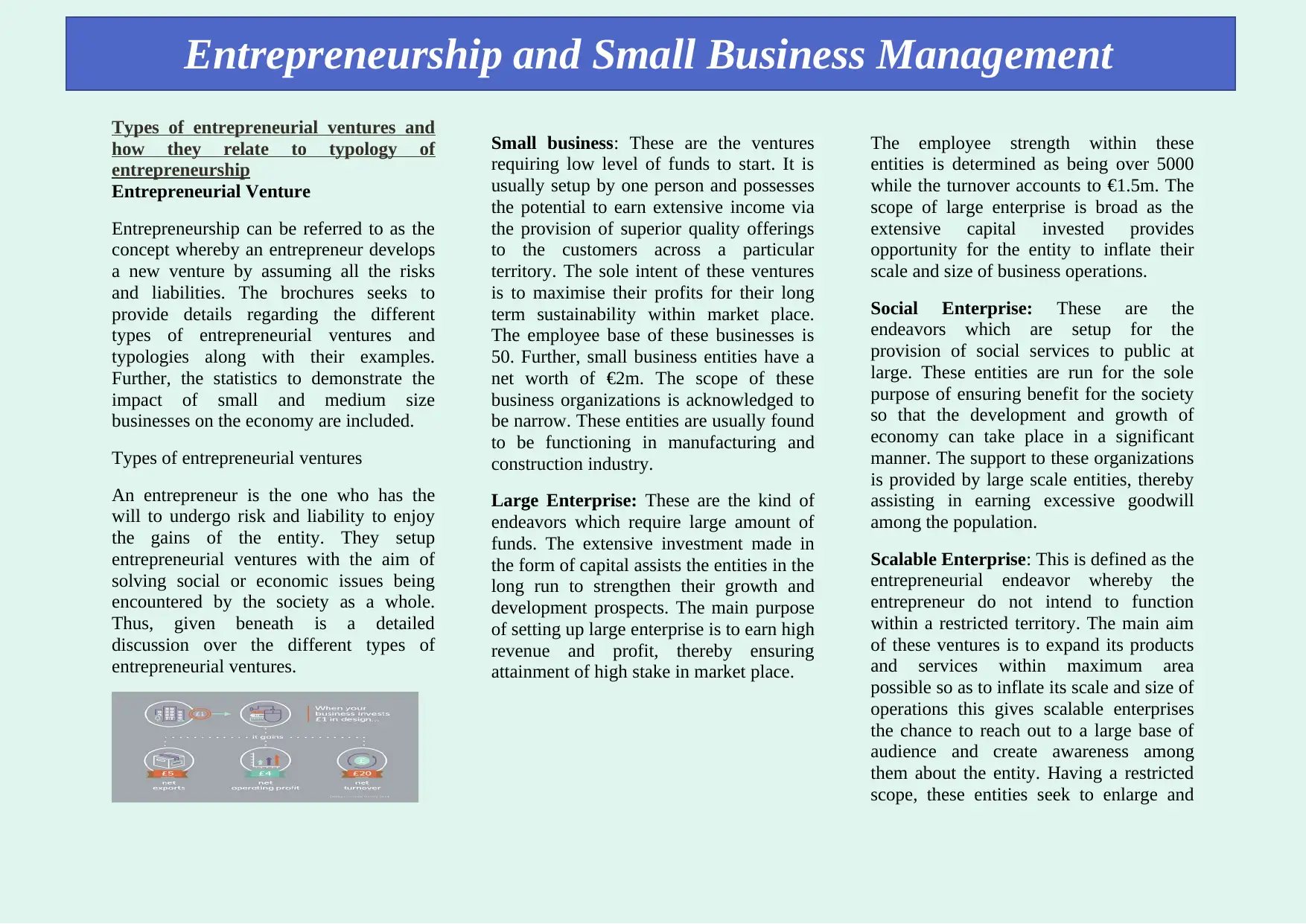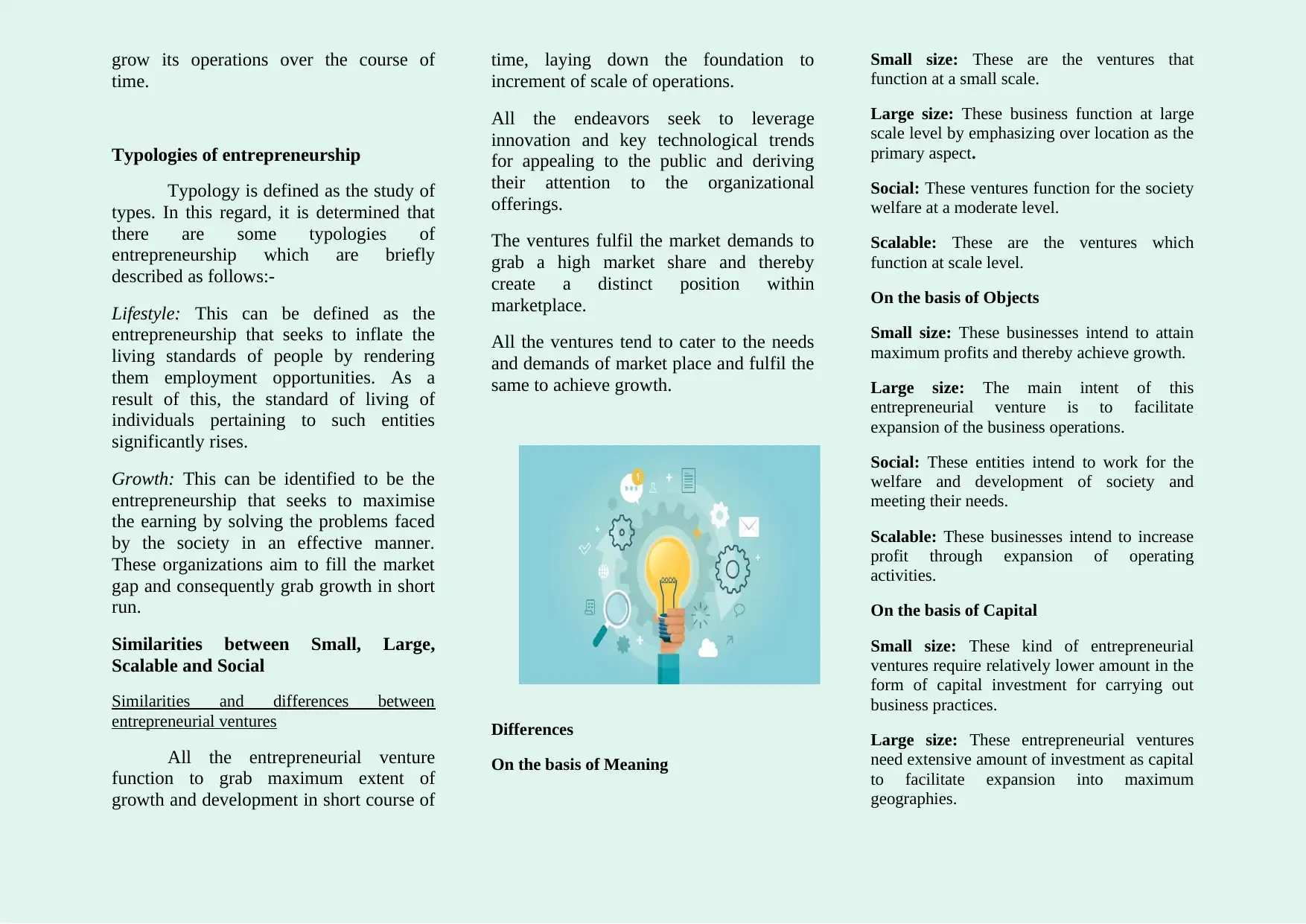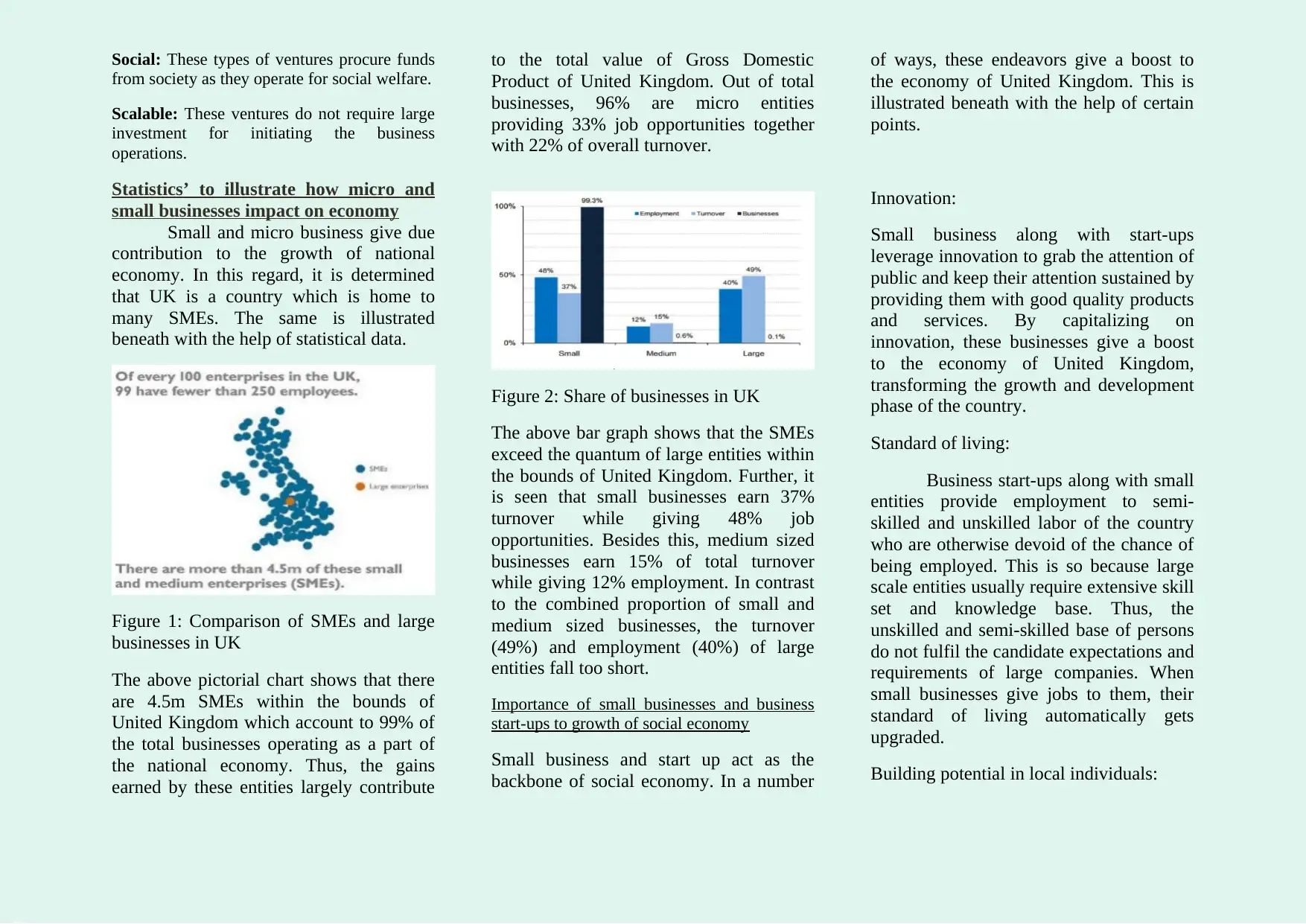Entrepreneurship: Ventures, Typology, and Economic Impact Report
VerifiedAdded on 2023/01/10
|5
|1546
|83
Report
AI Summary
This report provides a comprehensive overview of various entrepreneurial ventures, categorizing them into small businesses, large enterprises, social enterprises, and scalable enterprises. It delves into the typology of entrepreneurship, including lifestyle, growth-oriented, and social ventures, and their operational characteristics. The report further analyzes the impact of small and medium-sized businesses (SMEs) on the UK economy, supported by statistical data illustrating their contribution to employment, turnover, and innovation. It highlights the significance of small businesses and startups in fostering social economic growth, improving living standards, and building potential in local individuals by providing employment opportunities. The report also provides references to support the discussion.

Types of entrepreneurial ventures and
how they relate to typology of
entrepreneurship
Entrepreneurial Venture
Entrepreneurship can be referred to as the
concept whereby an entrepreneur develops
a new venture by assuming all the risks
and liabilities. The brochures seeks to
provide details regarding the different
types of entrepreneurial ventures and
typologies along with their examples.
Further, the statistics to demonstrate the
impact of small and medium size
businesses on the economy are included.
Types of entrepreneurial ventures
An entrepreneur is the one who has the
will to undergo risk and liability to enjoy
the gains of the entity. They setup
entrepreneurial ventures with the aim of
solving social or economic issues being
encountered by the society as a whole.
Thus, given beneath is a detailed
discussion over the different types of
entrepreneurial ventures.
Small business: These are the ventures
requiring low level of funds to start. It is
usually setup by one person and possesses
the potential to earn extensive income via
the provision of superior quality offerings
to the customers across a particular
territory. The sole intent of these ventures
is to maximise their profits for their long
term sustainability within market place.
The employee base of these businesses is
50. Further, small business entities have a
net worth of €2m. The scope of these
business organizations is acknowledged to
be narrow. These entities are usually found
to be functioning in manufacturing and
construction industry.
Large Enterprise: These are the kind of
endeavors which require large amount of
funds. The extensive investment made in
the form of capital assists the entities in the
long run to strengthen their growth and
development prospects. The main purpose
of setting up large enterprise is to earn high
revenue and profit, thereby ensuring
attainment of high stake in market place.
The employee strength within these
entities is determined as being over 5000
while the turnover accounts to €1.5m. The
scope of large enterprise is broad as the
extensive capital invested provides
opportunity for the entity to inflate their
scale and size of business operations.
Social Enterprise: These are the
endeavors which are setup for the
provision of social services to public at
large. These entities are run for the sole
purpose of ensuring benefit for the society
so that the development and growth of
economy can take place in a significant
manner. The support to these organizations
is provided by large scale entities, thereby
assisting in earning excessive goodwill
among the population.
Scalable Enterprise: This is defined as the
entrepreneurial endeavor whereby the
entrepreneur do not intend to function
within a restricted territory. The main aim
of these ventures is to expand its products
and services within maximum area
possible so as to inflate its scale and size of
operations this gives scalable enterprises
the chance to reach out to a large base of
audience and create awareness among
them about the entity. Having a restricted
scope, these entities seek to enlarge and
Entrepreneurship and Small Business Management
how they relate to typology of
entrepreneurship
Entrepreneurial Venture
Entrepreneurship can be referred to as the
concept whereby an entrepreneur develops
a new venture by assuming all the risks
and liabilities. The brochures seeks to
provide details regarding the different
types of entrepreneurial ventures and
typologies along with their examples.
Further, the statistics to demonstrate the
impact of small and medium size
businesses on the economy are included.
Types of entrepreneurial ventures
An entrepreneur is the one who has the
will to undergo risk and liability to enjoy
the gains of the entity. They setup
entrepreneurial ventures with the aim of
solving social or economic issues being
encountered by the society as a whole.
Thus, given beneath is a detailed
discussion over the different types of
entrepreneurial ventures.
Small business: These are the ventures
requiring low level of funds to start. It is
usually setup by one person and possesses
the potential to earn extensive income via
the provision of superior quality offerings
to the customers across a particular
territory. The sole intent of these ventures
is to maximise their profits for their long
term sustainability within market place.
The employee base of these businesses is
50. Further, small business entities have a
net worth of €2m. The scope of these
business organizations is acknowledged to
be narrow. These entities are usually found
to be functioning in manufacturing and
construction industry.
Large Enterprise: These are the kind of
endeavors which require large amount of
funds. The extensive investment made in
the form of capital assists the entities in the
long run to strengthen their growth and
development prospects. The main purpose
of setting up large enterprise is to earn high
revenue and profit, thereby ensuring
attainment of high stake in market place.
The employee strength within these
entities is determined as being over 5000
while the turnover accounts to €1.5m. The
scope of large enterprise is broad as the
extensive capital invested provides
opportunity for the entity to inflate their
scale and size of business operations.
Social Enterprise: These are the
endeavors which are setup for the
provision of social services to public at
large. These entities are run for the sole
purpose of ensuring benefit for the society
so that the development and growth of
economy can take place in a significant
manner. The support to these organizations
is provided by large scale entities, thereby
assisting in earning excessive goodwill
among the population.
Scalable Enterprise: This is defined as the
entrepreneurial endeavor whereby the
entrepreneur do not intend to function
within a restricted territory. The main aim
of these ventures is to expand its products
and services within maximum area
possible so as to inflate its scale and size of
operations this gives scalable enterprises
the chance to reach out to a large base of
audience and create awareness among
them about the entity. Having a restricted
scope, these entities seek to enlarge and
Entrepreneurship and Small Business Management
Paraphrase This Document
Need a fresh take? Get an instant paraphrase of this document with our AI Paraphraser

grow its operations over the course of
time.
Typologies of entrepreneurship
Typology is defined as the study of
types. In this regard, it is determined that
there are some typologies of
entrepreneurship which are briefly
described as follows:-
Lifestyle: This can be defined as the
entrepreneurship that seeks to inflate the
living standards of people by rendering
them employment opportunities. As a
result of this, the standard of living of
individuals pertaining to such entities
significantly rises.
Growth: This can be identified to be the
entrepreneurship that seeks to maximise
the earning by solving the problems faced
by the society in an effective manner.
These organizations aim to fill the market
gap and consequently grab growth in short
run.
Similarities between Small, Large,
Scalable and Social
Similarities and differences between
entrepreneurial ventures
All the entrepreneurial venture
function to grab maximum extent of
growth and development in short course of
time, laying down the foundation to
increment of scale of operations.
All the endeavors seek to leverage
innovation and key technological trends
for appealing to the public and deriving
their attention to the organizational
offerings.
The ventures fulfil the market demands to
grab a high market share and thereby
create a distinct position within
marketplace.
All the ventures tend to cater to the needs
and demands of market place and fulfil the
same to achieve growth.
Differences
On the basis of Meaning
Small size: These are the ventures that
function at a small scale.
Large size: These business function at large
scale level by emphasizing over location as the
primary aspect.
Social: These ventures function for the society
welfare at a moderate level.
Scalable: These are the ventures which
function at scale level.
On the basis of Objects
Small size: These businesses intend to attain
maximum profits and thereby achieve growth.
Large size: The main intent of this
entrepreneurial venture is to facilitate
expansion of the business operations.
Social: These entities intend to work for the
welfare and development of society and
meeting their needs.
Scalable: These businesses intend to increase
profit through expansion of operating
activities.
On the basis of Capital
Small size: These kind of entrepreneurial
ventures require relatively lower amount in the
form of capital investment for carrying out
business practices.
Large size: These entrepreneurial ventures
need extensive amount of investment as capital
to facilitate expansion into maximum
geographies.
time.
Typologies of entrepreneurship
Typology is defined as the study of
types. In this regard, it is determined that
there are some typologies of
entrepreneurship which are briefly
described as follows:-
Lifestyle: This can be defined as the
entrepreneurship that seeks to inflate the
living standards of people by rendering
them employment opportunities. As a
result of this, the standard of living of
individuals pertaining to such entities
significantly rises.
Growth: This can be identified to be the
entrepreneurship that seeks to maximise
the earning by solving the problems faced
by the society in an effective manner.
These organizations aim to fill the market
gap and consequently grab growth in short
run.
Similarities between Small, Large,
Scalable and Social
Similarities and differences between
entrepreneurial ventures
All the entrepreneurial venture
function to grab maximum extent of
growth and development in short course of
time, laying down the foundation to
increment of scale of operations.
All the endeavors seek to leverage
innovation and key technological trends
for appealing to the public and deriving
their attention to the organizational
offerings.
The ventures fulfil the market demands to
grab a high market share and thereby
create a distinct position within
marketplace.
All the ventures tend to cater to the needs
and demands of market place and fulfil the
same to achieve growth.
Differences
On the basis of Meaning
Small size: These are the ventures that
function at a small scale.
Large size: These business function at large
scale level by emphasizing over location as the
primary aspect.
Social: These ventures function for the society
welfare at a moderate level.
Scalable: These are the ventures which
function at scale level.
On the basis of Objects
Small size: These businesses intend to attain
maximum profits and thereby achieve growth.
Large size: The main intent of this
entrepreneurial venture is to facilitate
expansion of the business operations.
Social: These entities intend to work for the
welfare and development of society and
meeting their needs.
Scalable: These businesses intend to increase
profit through expansion of operating
activities.
On the basis of Capital
Small size: These kind of entrepreneurial
ventures require relatively lower amount in the
form of capital investment for carrying out
business practices.
Large size: These entrepreneurial ventures
need extensive amount of investment as capital
to facilitate expansion into maximum
geographies.

Social: These types of ventures procure funds
from society as they operate for social welfare.
Scalable: These ventures do not require large
investment for initiating the business
operations.
Statistics’ to illustrate how micro and
small businesses impact on economy
Small and micro business give due
contribution to the growth of national
economy. In this regard, it is determined
that UK is a country which is home to
many SMEs. The same is illustrated
beneath with the help of statistical data.
Figure 1: Comparison of SMEs and large
businesses in UK
The above pictorial chart shows that there
are 4.5m SMEs within the bounds of
United Kingdom which account to 99% of
the total businesses operating as a part of
the national economy. Thus, the gains
earned by these entities largely contribute
to the total value of Gross Domestic
Product of United Kingdom. Out of total
businesses, 96% are micro entities
providing 33% job opportunities together
with 22% of overall turnover.
Figure 2: Share of businesses in UK
The above bar graph shows that the SMEs
exceed the quantum of large entities within
the bounds of United Kingdom. Further, it
is seen that small businesses earn 37%
turnover while giving 48% job
opportunities. Besides this, medium sized
businesses earn 15% of total turnover
while giving 12% employment. In contrast
to the combined proportion of small and
medium sized businesses, the turnover
(49%) and employment (40%) of large
entities fall too short.
Importance of small businesses and business
start-ups to growth of social economy
Small business and start up act as the
backbone of social economy. In a number
of ways, these endeavors give a boost to
the economy of United Kingdom. This is
illustrated beneath with the help of certain
points.
Innovation:
Small business along with start-ups
leverage innovation to grab the attention of
public and keep their attention sustained by
providing them with good quality products
and services. By capitalizing on
innovation, these businesses give a boost
to the economy of United Kingdom,
transforming the growth and development
phase of the country.
Standard of living:
Business start-ups along with small
entities provide employment to semi-
skilled and unskilled labor of the country
who are otherwise devoid of the chance of
being employed. This is so because large
scale entities usually require extensive skill
set and knowledge base. Thus, the
unskilled and semi-skilled base of persons
do not fulfil the candidate expectations and
requirements of large companies. When
small businesses give jobs to them, their
standard of living automatically gets
upgraded.
Building potential in local individuals:
from society as they operate for social welfare.
Scalable: These ventures do not require large
investment for initiating the business
operations.
Statistics’ to illustrate how micro and
small businesses impact on economy
Small and micro business give due
contribution to the growth of national
economy. In this regard, it is determined
that UK is a country which is home to
many SMEs. The same is illustrated
beneath with the help of statistical data.
Figure 1: Comparison of SMEs and large
businesses in UK
The above pictorial chart shows that there
are 4.5m SMEs within the bounds of
United Kingdom which account to 99% of
the total businesses operating as a part of
the national economy. Thus, the gains
earned by these entities largely contribute
to the total value of Gross Domestic
Product of United Kingdom. Out of total
businesses, 96% are micro entities
providing 33% job opportunities together
with 22% of overall turnover.
Figure 2: Share of businesses in UK
The above bar graph shows that the SMEs
exceed the quantum of large entities within
the bounds of United Kingdom. Further, it
is seen that small businesses earn 37%
turnover while giving 48% job
opportunities. Besides this, medium sized
businesses earn 15% of total turnover
while giving 12% employment. In contrast
to the combined proportion of small and
medium sized businesses, the turnover
(49%) and employment (40%) of large
entities fall too short.
Importance of small businesses and business
start-ups to growth of social economy
Small business and start up act as the
backbone of social economy. In a number
of ways, these endeavors give a boost to
the economy of United Kingdom. This is
illustrated beneath with the help of certain
points.
Innovation:
Small business along with start-ups
leverage innovation to grab the attention of
public and keep their attention sustained by
providing them with good quality products
and services. By capitalizing on
innovation, these businesses give a boost
to the economy of United Kingdom,
transforming the growth and development
phase of the country.
Standard of living:
Business start-ups along with small
entities provide employment to semi-
skilled and unskilled labor of the country
who are otherwise devoid of the chance of
being employed. This is so because large
scale entities usually require extensive skill
set and knowledge base. Thus, the
unskilled and semi-skilled base of persons
do not fulfil the candidate expectations and
requirements of large companies. When
small businesses give jobs to them, their
standard of living automatically gets
upgraded.
Building potential in local individuals:
⊘ This is a preview!⊘
Do you want full access?
Subscribe today to unlock all pages.

Trusted by 1+ million students worldwide

Small business give employment
opportunities to those individuals who are
denied to get job in large companies due to
lack of skills, potential and competency.
Thus, small businesses enhance their
professional personalities by providing
them with training & development
sessions. As a result of this, the otherwise
non empowered population of UK also get
a chance to get employment in their own
country and thereby feel empowered for
giving effective contribution to the
development of economy in the long run.
References
opportunities to those individuals who are
denied to get job in large companies due to
lack of skills, potential and competency.
Thus, small businesses enhance their
professional personalities by providing
them with training & development
sessions. As a result of this, the otherwise
non empowered population of UK also get
a chance to get employment in their own
country and thereby feel empowered for
giving effective contribution to the
development of economy in the long run.
References
Paraphrase This Document
Need a fresh take? Get an instant paraphrase of this document with our AI Paraphraser

What Is Entrepreneurship? – Types &
Importance. 2019. [Online]. Available
through:
<https://www.feedough.com/what-is-
entrepreneurship-types-importance/>.
Importance. 2019. [Online]. Available
through:
<https://www.feedough.com/what-is-
entrepreneurship-types-importance/>.
1 out of 5
Related Documents
Your All-in-One AI-Powered Toolkit for Academic Success.
+13062052269
info@desklib.com
Available 24*7 on WhatsApp / Email
![[object Object]](/_next/static/media/star-bottom.7253800d.svg)
Unlock your academic potential
Copyright © 2020–2026 A2Z Services. All Rights Reserved. Developed and managed by ZUCOL.



